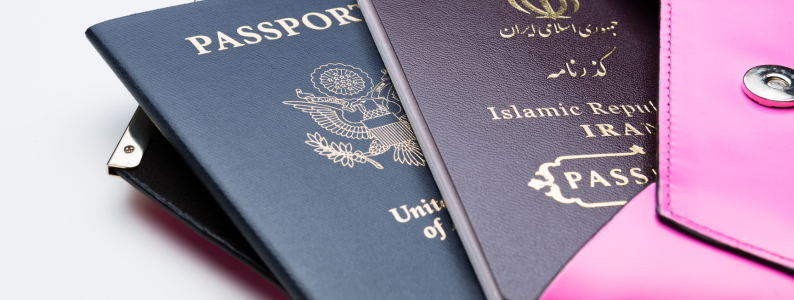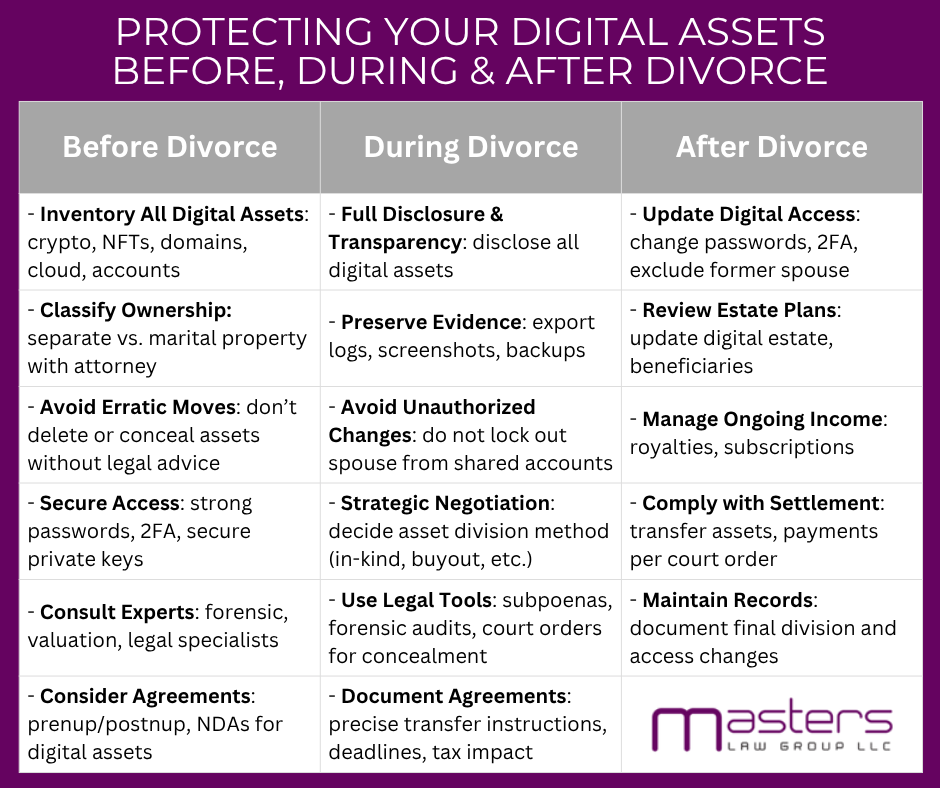Divorce and Business Ownership: What Founders Need to Know
For founders and entrepreneurs, a divorce can complicate not only personal finances but also the future of their business. Understanding the potential risks, legal considerations, and strategies for protecting your business is essential.
This guide will walk you through what business owners need to know when facing a divorce.
The Intersection of Divorce and Business Ownership
Business ownership adds a unique layer of complexity to divorce proceedings. Unlike a bank account or real estate property, a business often represents both financial and emotional investment. In most states, marital property laws govern how business assets are treated during divorce, and courts may consider:
- The value of the business
- The contributions of each spouse
- The future earning potential of the business
Even if a spouse was not directly involved in day-to-day operations, they may still be entitled to a portion of the business’s value, particularly if marital funds were used to start or grow the business.
Determining Whether a Business Is Marital Property
One of the first questions in a divorce involving a business is whether the business is considered marital or separate property.
Separate Property vs. Marital Property
- Separate property: Assets acquired before marriage, or assets received as gifts or inheritances, are generally considered separate property.
- Marital property: Assets acquired or increased in value during the marriage are typically considered marital property and may be subject to division.
Factors That Courts Consider
Courts evaluate several factors to determine whether a business is marital property, including:
- When the business was founded: If the business existed before the marriage, only its post-marriage growth may be considered marital property.
- Use of marital resources: If marital funds, assets, or labor contributed to the business, it may be considered partially marital property.
- Spouse involvement: Even indirect involvement, such as handling finances, marketing, or administrative tasks, can influence courts’ decisions.
Valuing a Business in Divorce
Valuing a business is one of the most contentious aspects of divorce involving founders. Businesses are rarely liquid, and their worth can fluctuate based on market conditions, industry trends, and internal performance metrics.
Common Business Valuation Methods
- Asset-Based Approach: Focuses on the value of a company’s tangible and intangible assets.
- Income-Based Approach: Considers the business’s potential to generate future income.
- Market Approach: Compares the business to similar companies that have recently sold.
Choosing the Right Expert
Business valuation requires specialized knowledge. Engaging a forensic accountant or valuation expert is critical to ensure an accurate assessment. An improper valuation can result in significant financial loss for either party.
Strategies for Protecting Your Business
While divorce cannot always be avoided, founders can take proactive steps to protect their business.
Pre-Marital or Post-Marital Agreements
- Prenuptial agreements can define ownership and protect business interests before marriage.
- Postnuptial agreements may be used after marriage to clarify how business assets will be treated in case of divorce.
- Qualified Small Business Stock (QSBS) enhancements: For QSBS acquired after July 4, 2025, tiered capital gains exclusions (50% at 3 years, 75% at 4 years, 100% at 5+ years) and a $15M per-issuer cap (indexed post-2026) now offer greater protection on business sales tied to divorce buyouts.
Keeping Business and Personal Finances Separate
Maintaining a clear separation between business and personal finances is crucial. Commingling funds, such as paying personal expenses from business accounts, can increase the likelihood that a court will consider the business a marital asset.
Insurance and Buy-Sell Agreements
For businesses with co-founders or partners, buy-sell agreements and key person insurance can provide financial protection and continuity in the event of divorce. These tools can help prevent disputes from derailing operations.
Considerations for Different Types of Business Structures
The structure of your business can impact how it is treated during divorce:
- Sole Proprietorship: The business is directly tied to the owner, making it easier for a spouse to claim a portion.
- Partnership or LLC: Ownership is shared, and agreements among partners can influence division.
- Corporation: Shares of stock may be treated as marital property, but transfer restrictions or shareholder agreements can protect the company.
Understanding your entity structure can be vital when planning for a potential divorce.
Division of Business Assets and Compensation
Dividing business assets is not always straightforward. Courts may award one spouse ownership of the business while compensating the other with cash or other assets.
Key Considerations
- Buyouts: One spouse may buy out the other’s interest based on a court-approved valuation.
- Co-ownership: Rarely, spouses may continue co-ownership, but this often creates operational challenges.
- Alimony and Child Support: Business profits can affect support calculations, requiring careful documentation of income and expenses.
- Section 199A permanence: The Act makes the 20% qualified business income deduction permanent for pass-through entities (S-corps, LLCs), with raised phase-in thresholds ($75K single/$150K joint), stabilizing income reporting for support calculations post-divorce.
Tax Implications of Divorce on Business Owners
Divorce can have significant tax consequences for business owners. Key considerations include:
- Capital gains: Selling a portion of the business to a spouse may trigger capital gains taxes.
- Income reporting: Business income may affect alimony and child support calculations.
- Deductions: Proper planning can help optimize tax benefits and avoid penalties.
- Bonus depreciation revival: The 2025 One Big Beautiful Bill Act restores 100% first-year bonus depreciation for qualified business property placed in service after Jan. 19, 2025, aiding founders in restructuring assets during settlements.
Planning for Liquidity Needs
Many business owners face challenges with liquidity during divorce. Even if a business is highly valuable on paper, it may not generate enough cash to cover a settlement.
Strategies to Address Liquidity
- Installment Payments: Spreading payments over time can reduce financial strain.
- Third-Party Financing: Loans or lines of credit can fund buyouts.
- Asset Swaps: Offering other marital assets in lieu of cash can simplify the division.
Emotional and Operational Considerations
Divorce is not just a financial event; it’s deeply personal. For founders, divorce can affect:
- Employee morale: Uncertainty about ownership may impact staff retention and productivity.
- Decision-making: Emotional stress can hinder strategic decisions and growth.
- Business reputation: Public disputes can influence customer perception and partnerships.
It’s important to approach divorce with both legal and operational strategies to maintain business stability.
Working with the Right Legal Team
Navigating divorce as a business owner requires legal knowledge and experience. At Masters Law Group, we understand the unique challenges founders face and provide comprehensive support, including:
- Business valuation and expert engagement
- Negotiation of marital property division
- Drafting and reviewing pre- and post-nuptial agreements
- Tax and estate planning considerations
- Protecting ongoing business operations
A skilled team can help mitigate risks and ensure that your business and your personal financial future remain secure.
Key Takeaways for Founders
Divorce and business ownership intersect in complex ways. Founders should keep the following in mind:
- Understand your state’s marital property laws. Ownership stakes may be considered marital property even if your spouse was not involved.
- Obtain an accurate business valuation. Engaging a qualified expert is critical for fair division.
- Plan ahead with agreements and documentation. Prenuptial, postnuptial, and buy-sell agreements can protect your business.
- Consider tax and liquidity implications. Cash flow, buyouts, and capital gains all require careful planning.
- Work with experienced legal counsel. Specialized divorce attorneys can protect both your business and personal interests.
Final Thoughts
Divorce can be daunting for any individual, but for business owners, the stakes are exponentially higher. A proactive approach, grounded in legal expertise, accurate valuations, and strategic planning, can safeguard your business, financial future, and peace of mind.
At Masters Law Group, we have extensive experience guiding founders through these complex situations. Whether you are facing a divorce, planning for the future, or seeking to protect your business, our team provides the legal guidance, strategic insight, and compassionate support you need.
Contact Masters Law Group today to learn how we can help you navigate divorce while protecting your business and personal interests at masters-lawgroup.com.
Disclaimer: This blog is for informational purposes only and does not constitute legal advice. Please consult a qualified attorney regarding your specific circumstances.




































